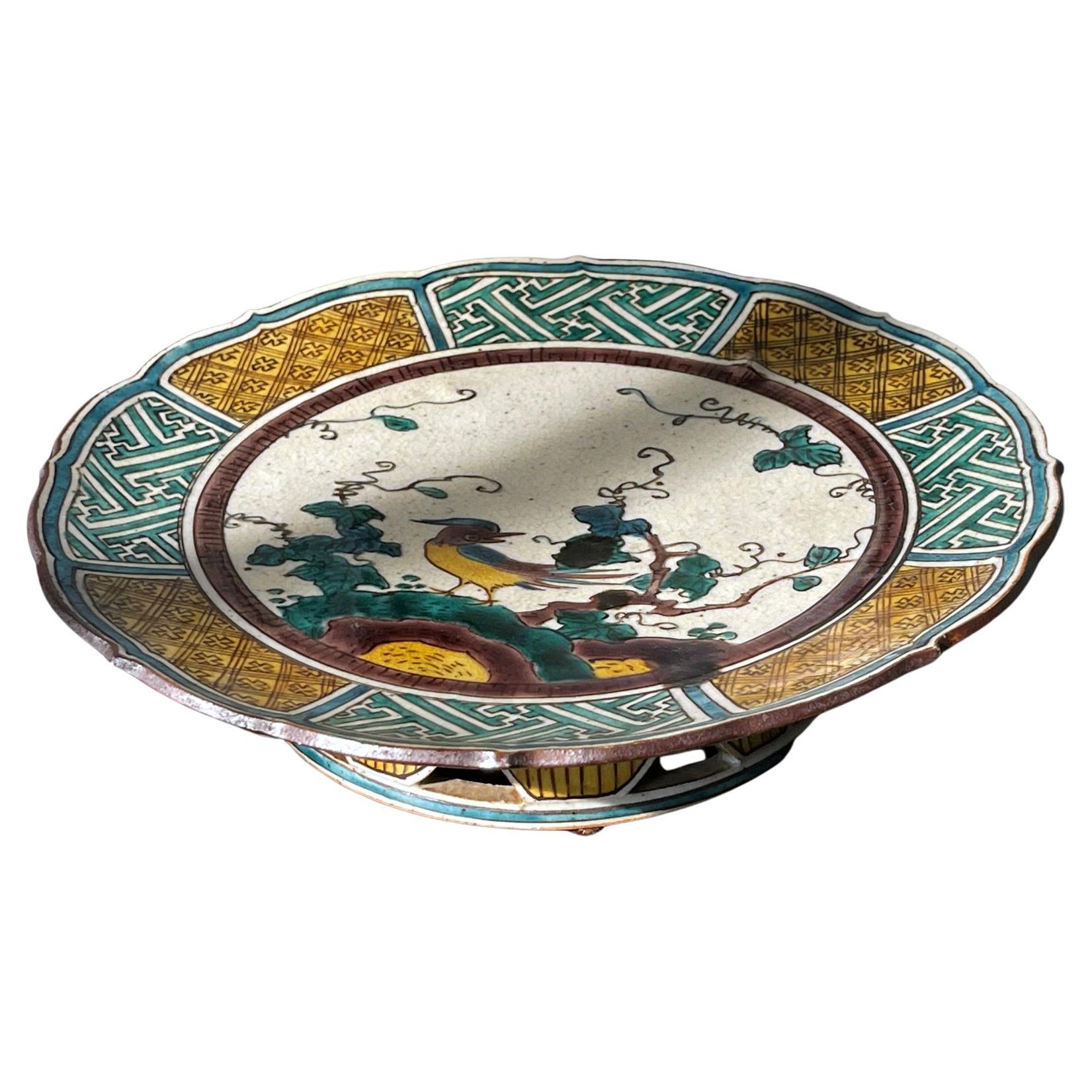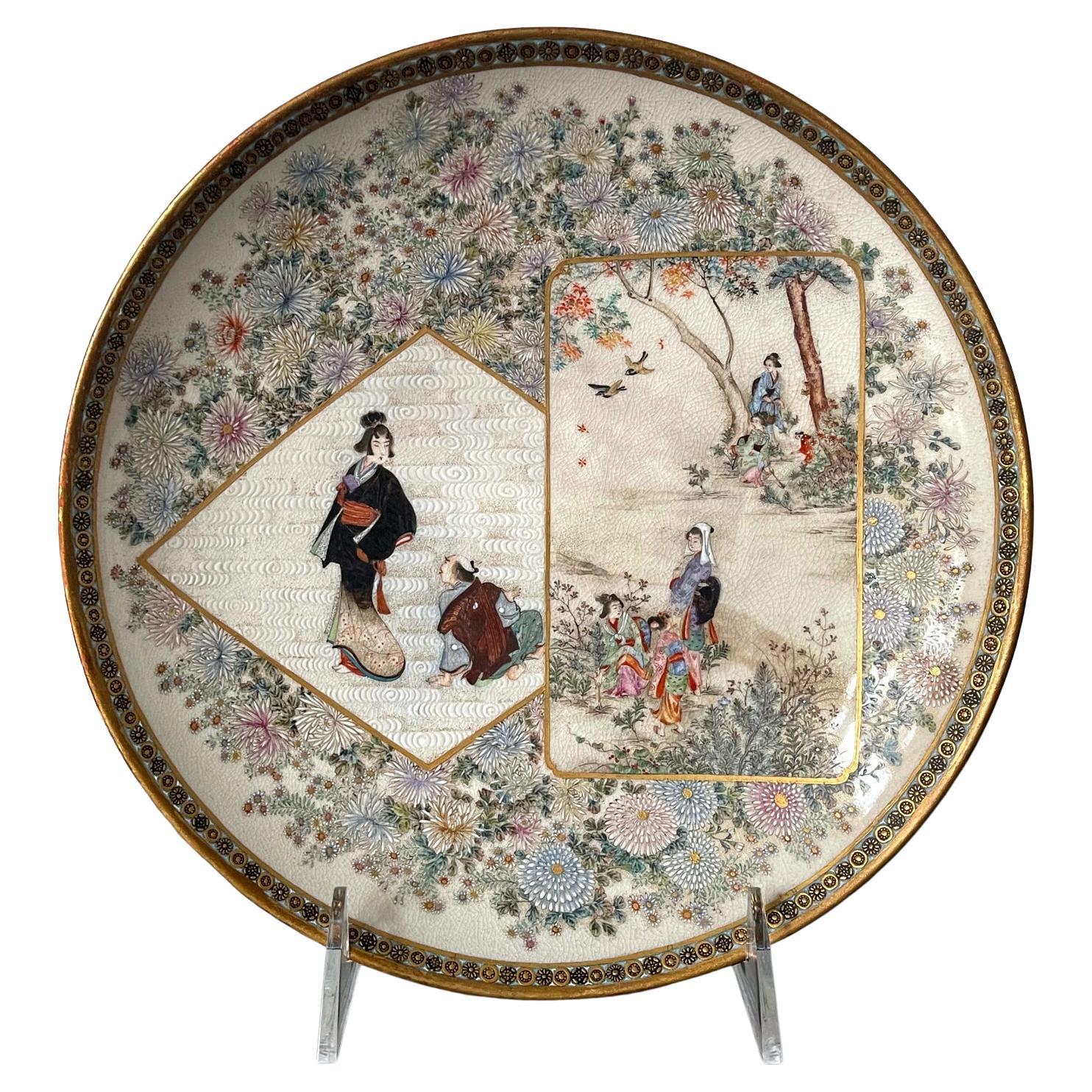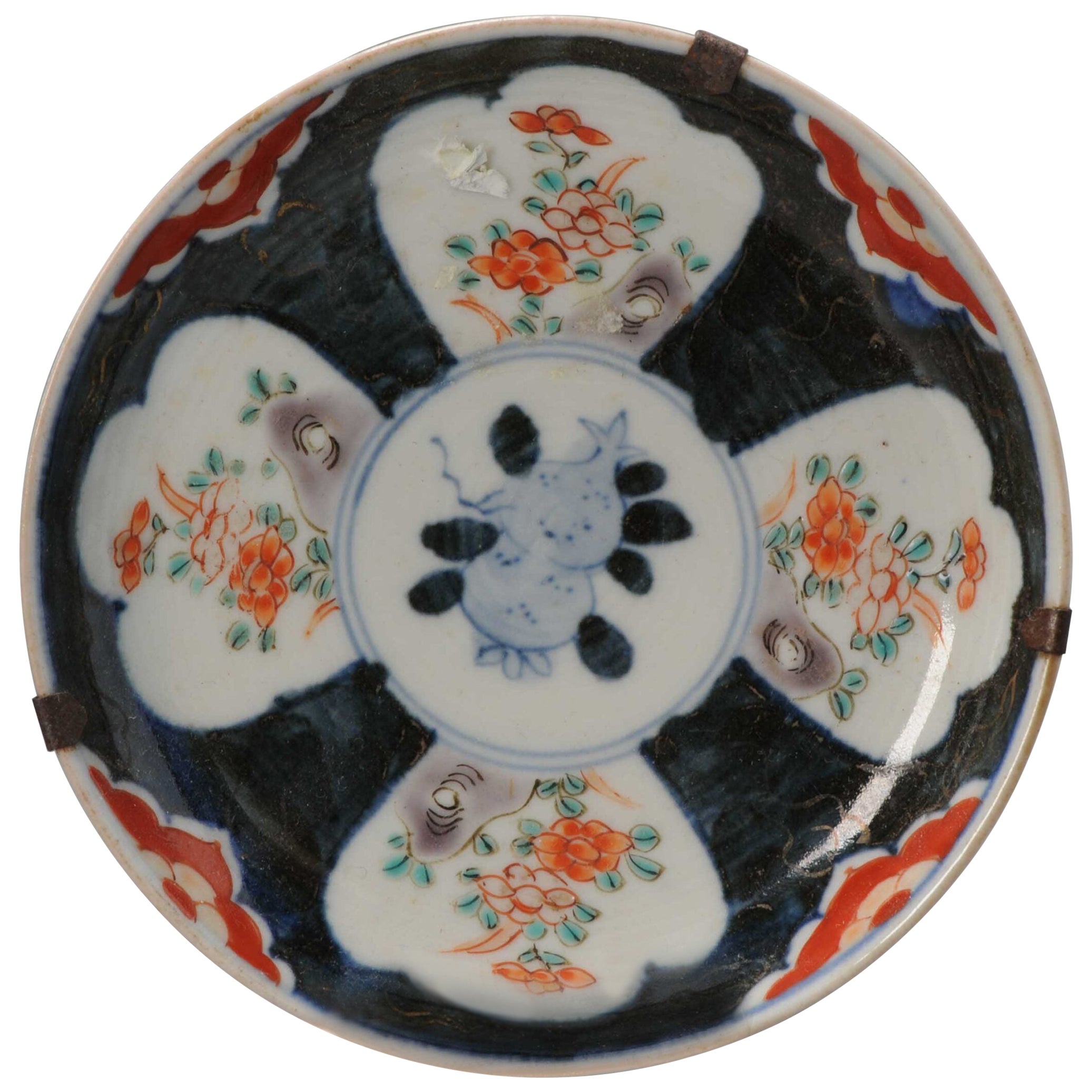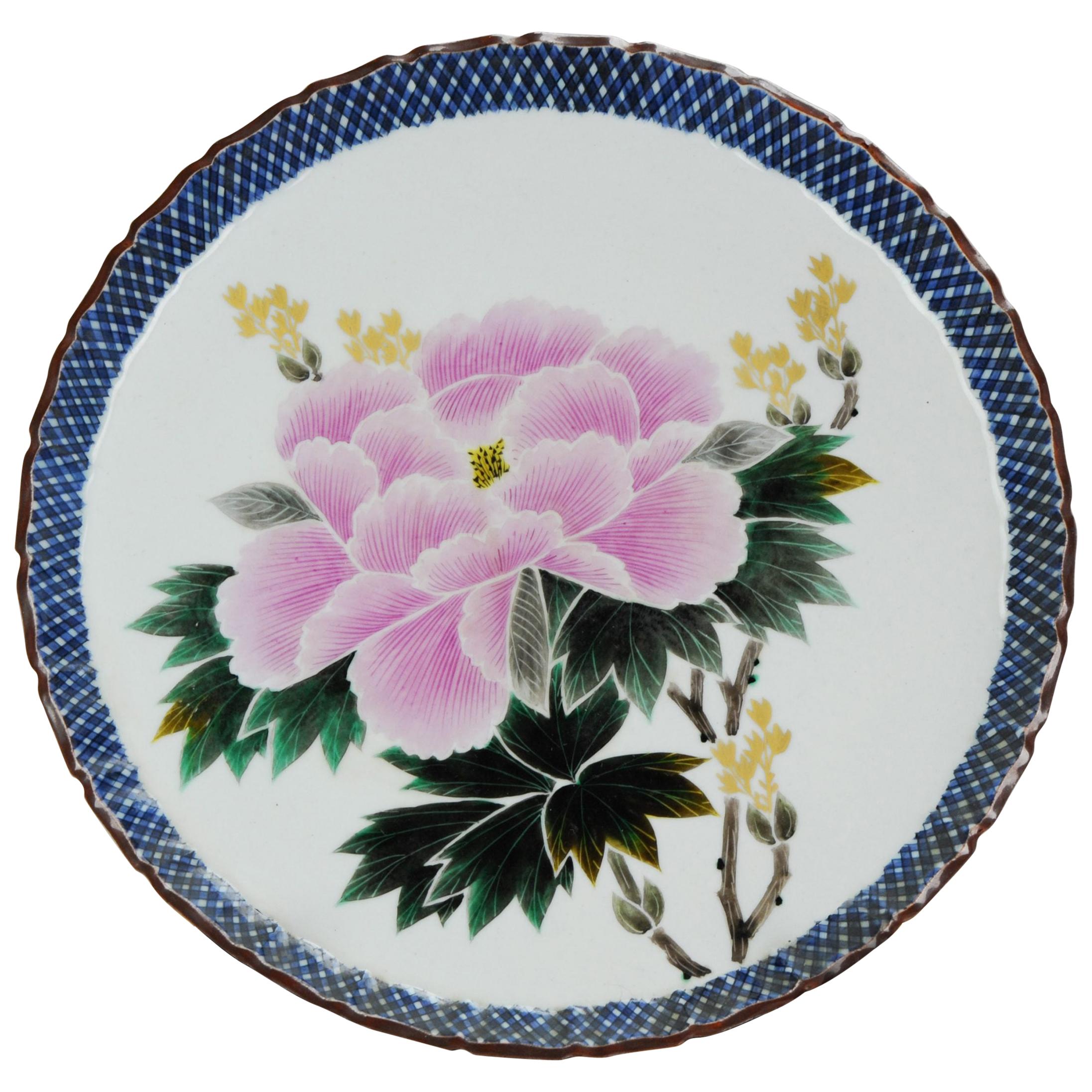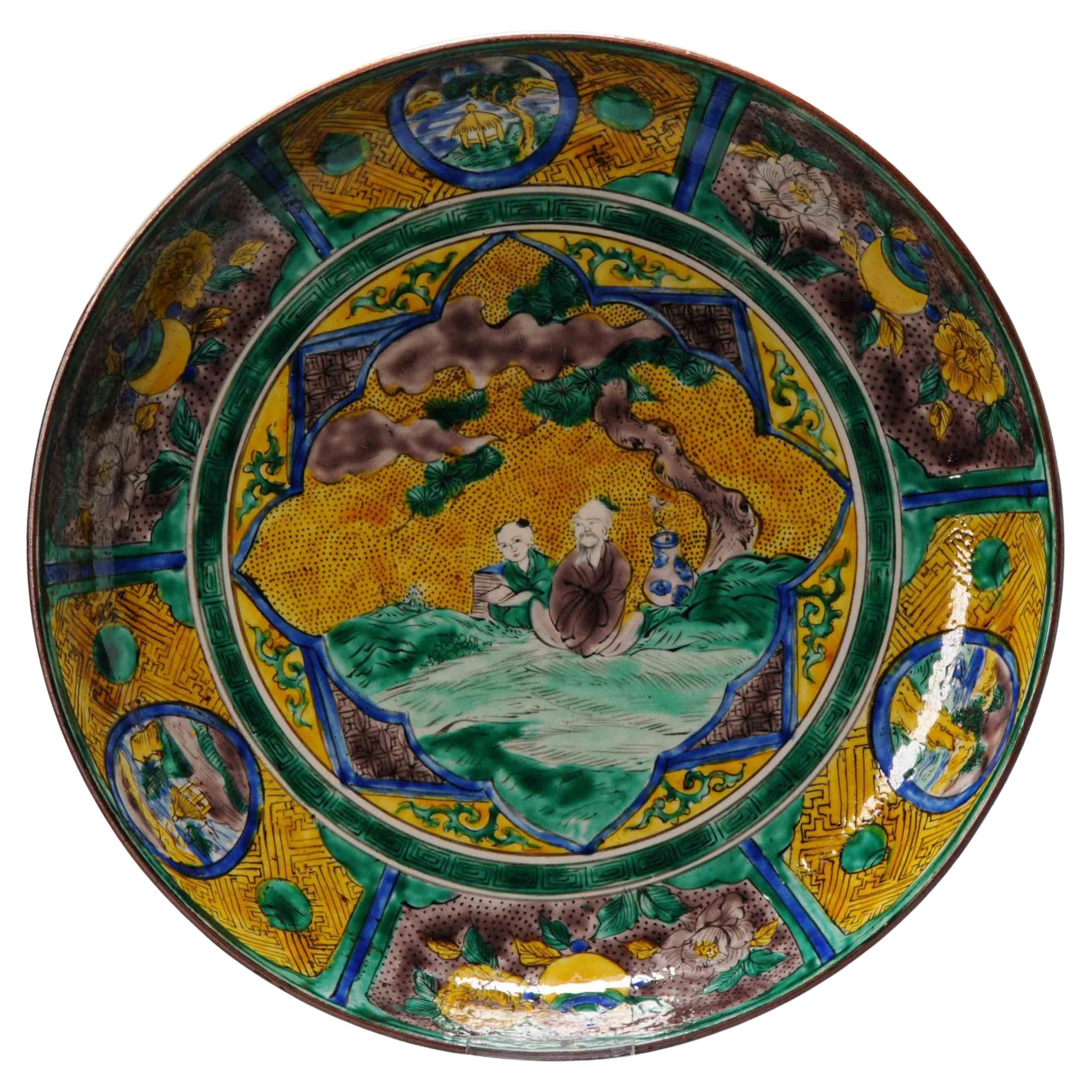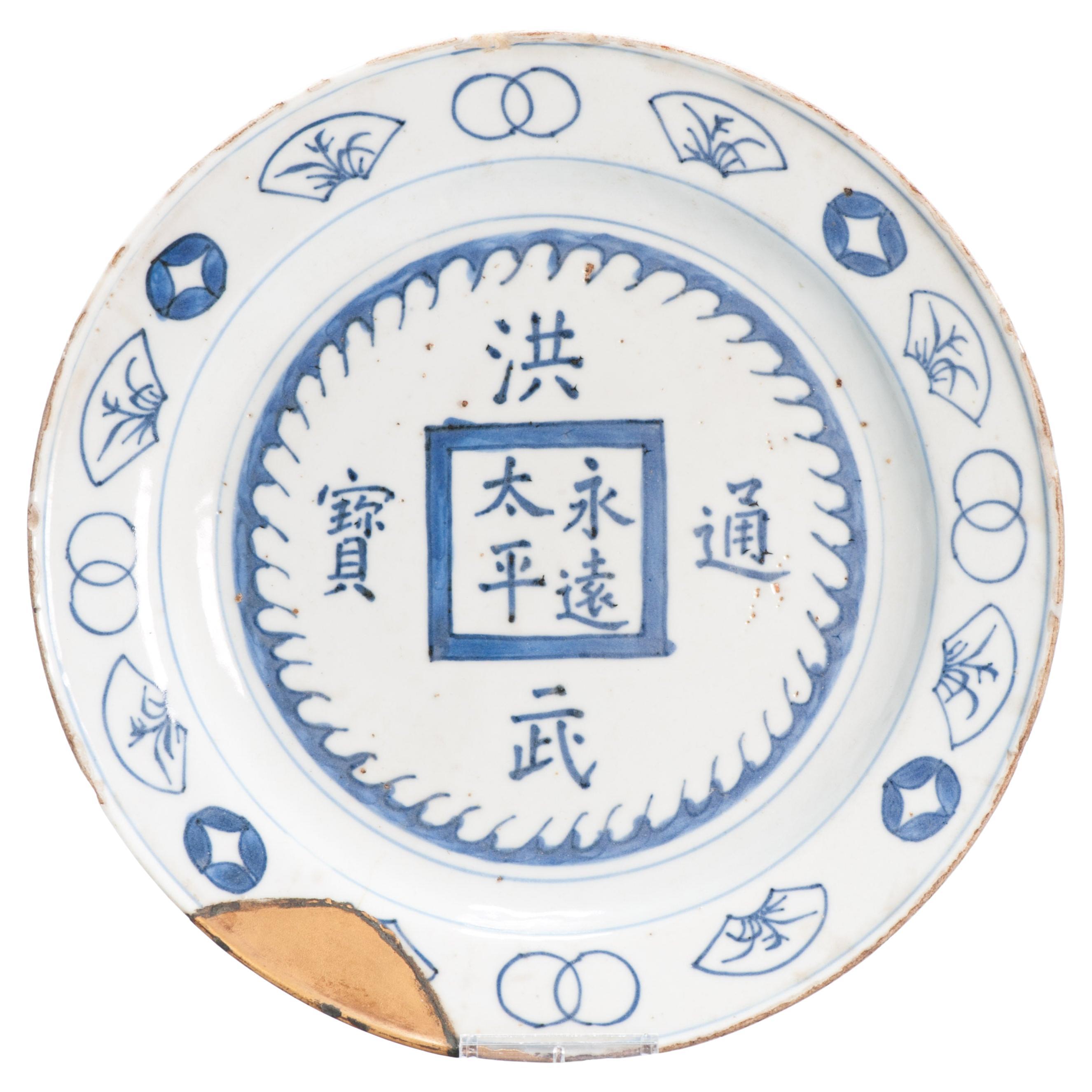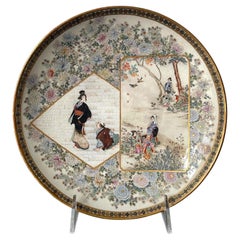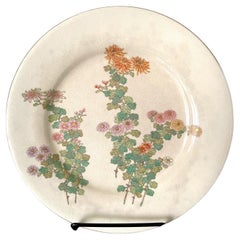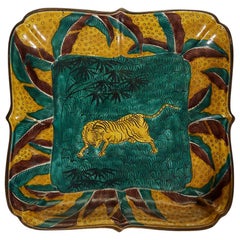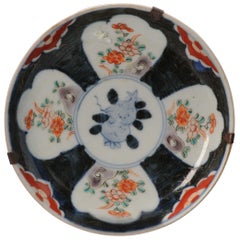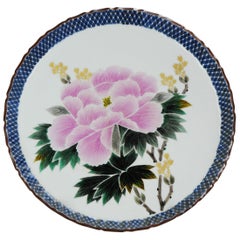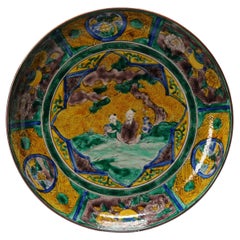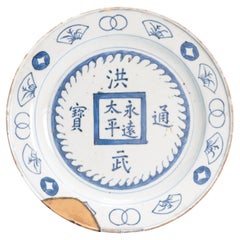Items Similar to Japanese Ceramic Dish Meiji Ogata Kenzan
Want more images or videos?
Request additional images or videos from the seller
1 of 12
Japanese Ceramic Dish Meiji Ogata Kenzan
$1,600
£1,223.29
€1,408.98
CA$2,242.09
A$2,503.08
CHF 1,311.58
MX$30,640.20
NOK 16,657.05
SEK 15,705.49
DKK 10,515.34
About the Item
A Japanese ceramic shallow dish in square form with rounded corners from Meiji period in the style of Ogata Kenzan. The dish features a cream color crackled glaze with iron underglaze paint that evokes the aesthetic of ink painting. A bundle of floral design is placed sparsely in the center, accompanied by a line of poetry in Kanji that translates as "the fragrance at the transition from spring to summer". It is signed Kenzan and marked with two red seals. The exterior skirt of the dish is decorated with cloud designs. The dish comes with wood storage box. Based on the style of the painting and calligraphy, we think that the dish was likely made in Meiji period circa 19th century in the style of Ogata Kenzan.
- Dimensions:Height: 8.25 in (20.96 cm)Width: 8.25 in (20.96 cm)Depth: 1 in (2.54 cm)
- Style:Meiji (Of the Period)
- Materials and Techniques:
- Place of Origin:
- Period:
- Date of Manufacture:19th Century
- Condition:Wear consistent with age and use. some surface wear consistent with age.
- Seller Location:Atlanta, GA
- Reference Number:1stDibs: LU945020285512
About the Seller
4.9
Platinum Seller
Premium sellers with a 4.7+ rating and 24-hour response times
Established in 2006
1stDibs seller since 2010
565 sales on 1stDibs
Typical response time: <1 hour
- ShippingRetrieving quote...Shipping from: Atlanta, GA
- Return Policy
Authenticity Guarantee
In the unlikely event there’s an issue with an item’s authenticity, contact us within 1 year for a full refund. DetailsMoney-Back Guarantee
If your item is not as described, is damaged in transit, or does not arrive, contact us within 7 days for a full refund. Details24-Hour Cancellation
You have a 24-hour grace period in which to reconsider your purchase, with no questions asked.Vetted Professional Sellers
Our world-class sellers must adhere to strict standards for service and quality, maintaining the integrity of our listings.Price-Match Guarantee
If you find that a seller listed the same item for a lower price elsewhere, we’ll match it.Trusted Global Delivery
Our best-in-class carrier network provides specialized shipping options worldwide, including custom delivery.More From This Seller
View AllAntique Japanese Ceramic Ko-Kutani Revival Footed Dish
Located in Atlanta, GA
A Japanese glazed ceramic footed dish made in the Ko-Kutani type of Edo period but likely during Kutani revival in the 19th century Meiji Period. The dish with delicate foliaged rim ...
Category
Antique 19th Century Japanese Japonisme Ceramics
Materials
Ceramic
Japanese Satsuma Ceramic Dish with Fine Decoration by Kinkozan
By Kinkozan
Located in Atlanta, GA
A satsuma ceramic dish made by Kinkozan studio circa 1980-1900s in the late Meiji Period. The dish with a thick robust wall is supported by a large ring base and features finely deta...
Category
Antique Late 19th Century Japanese Meiji Ceramics
Materials
Ceramic
Fine Japanese Ceramic Plate by Kinkozan for Yamanaka & Co.
By Kinkozan
Located in Atlanta, GA
A fine Japanese ceramic satsuma plate made by Kinkozan and retailed by Yamanaka & Co. circa 1900-20s (late Meiji to early Tasho Period). The cream-color...
Category
Early 20th Century Japanese Meiji Ceramics
Materials
Ceramic
Japanese Yoshidaya Saiko Kutani Ceramic Dish
By Yoshidaya
Located in Atlanta, GA
A Japanese Ao-Kutani stoneware dish with overglaze decoration in the shape of barbed quatrefoil shape from late Edo period, circa early mid-19th century. Around 1804, 100 years after Ko-Kutani (old-Kutani) ware disappeared abruptly after thriving from 1655-early 1700s, saiko-kutani (revived-kutani) was attempted by many kilns and several distinguished styles developed. Among them, Yoshidaya kiln attempted to revive the original style of Ko-Kutani known as Aote, which employed four dark colors: green, yellow, dark blue/black and aubergine to create bold and striking design. The Yoshidaya production was short-lived and lasted roughly from 1823-1831. This dish is likely dated from this period or shortly after. The overglaze design centered around a crouching tiger under a black bamboo grove in a deep green background, surrounded by luxuriant banana leaves in green and aubergine with black outlines. The base of a similar concentric barbed quatrefoil design is further decorated with black foliage outlines and marked with a square Fuku mark.
For a Yoshidaya dish with identical shape but different landscape decoration, see lot 79 of sale 6547 Christie's London. Important Japanese and Chinese Art...
Category
Antique 19th Century Japanese Japonisme Ceramics
Materials
Ceramic
Fine Japanese Ceramic Plate by Kinkozan for Yamanaka & Co.
By Kinkozan
Located in Atlanta, GA
A fine Japanese ceramic satsuma plate made by Kinkozan and retailed by Yamanaka & Co. circa 1900-20s (late Meiji to early Tasho Period). The cream-color glazed plate features a very fine decoration of a maple tree in the midst of foliage color-changing in autumn. The poetic composition is stylized but also realistic, with a literati painter's quality, and was advantageously enhanced by the enamel colorings in incredible details. The maple tree is one of the favored motifs by the fine satsuma potters such as Yabu Meizan as it demonstrates the painter's skill. It is signed on the base in gilt kanji seal (Made by Kinkozan) and branded Yamanaka & Co in English. The plate was likely commissioned by the company from Kinkozan for its various galleries in US and Europe.
The Kinkozan family established their pottery business first in 1645 and by the end of 19th century, it had become the largest studio producer of Satsuma ware. By the 1850s, Kinkozan Sobei...
Category
Early 20th Century Japanese Meiji Ceramics
Materials
Ceramic
Japanese Seto Mingei Ceramic Plate Ishizara Edo Peorid
Located in Atlanta, GA
A glazed stoneware Ishizara (food serving platter) from Seto kilns. The platter features an unusual lobed edge and a slight irregular form from hand made....
Category
Antique Early 19th Century Japonisme Centerpieces
Materials
Ceramic
You May Also Like
Antique Japanese Porcelain Edo Period Dish Floral Imari
Located in Amsterdam, Noord Holland
Porcelain decorated in Japan
Edo , c. 1700
Saucer dish
Additional information:
Material: Porcelain & Pottery
Type: Tea/Coffee Drinking: Bowls, Cups & Teapots
Category: Blue & White ...
Category
Antique 17th Century Edo Decorative Dishes and Vide-Poche
Materials
Porcelain
$281 Sale Price
20% Off
Vintage 20th Century Japanese Arita Colored Kutani Large Plate Top Quality Po
Located in Amsterdam, Noord Holland
A very nicely decorated Japanese Kutani plate, vintage.
Condition:
Perfect. Size: 260 x 37mm
Period:
20th century.
Category
Antique 19th Century Japanese Meiji Ceramics
Materials
Earthenware
$1,795 Sale Price
20% Off
Antique 19th Century Japanese Porcelain Yoshidaya Kutani Large Dish, Japan
Located in Amsterdam, Noord Holland
Sharing with you this lovely and unusal Kutani porcelain large dish. The dish is of circular form and has a scene of a wise man and his apprentice in a landscape scene. With beautiful colors and very nicely painted.
Base marked with a Fuku mark...
Category
Antique 19th Century Japanese Qing Ceramics
Materials
Porcelain
$4,631 Sale Price
20% Off
Antique Ming Kosometsuke Chinese Porcelain Dish Literati Hongwu Marked
Located in Amsterdam, Noord Holland
A chinese Tianqi period, 17th century dish, Jingdezhen Kilns.
Diameter: 17 CM
This porcelain dish is depicting motif of Coin 洪武通宝 Hong Wu Tong Bao (coin of Emperor Hongwu) and auspi...
Category
Antique 17th Century Chinese Ming Planters, Cachepots and Jardinières
Materials
Porcelain
$4,005 Sale Price
20% Off
Antique Chinese Porcelain 17th Century Late Ming Chinese Japanese Taste Plate
Located in Amsterdam, Noord Holland
A very nicely decorated plate with a scene flowers. Very rare and very modern design. Domestic market or Japanese market from Jingdezhen. Late Ming Wanli or Tianqi. Top Quality
28...
Category
Antique 17th Century Chinese Ming Ceramics
Materials
Porcelain
$7,561 Sale Price
20% Off
Japanese Arita Kraak type Dish, Mid-17th century, Edo Period
Located in seoul, KR
This piece was created in Japan presumably during the second half of the 17th century, with two archaic-style kanji characters, "酬酬" (shu shu), engraved on the bottom. A identical piece is housed in the National Museum of Warsaw.
Period : Edo Period, Japan
Date : 17th century
Provenance : Acquired in late 1990s from Hongkong
Reference : National Museum of Warsaw - Inventory Number SKAZsz 1230 MNW
(Type : Highly related)
* Japanese Edo Period Kraak
The Japanese 17th...
Category
Antique 17th Century Japanese Antiquities
Materials
Ceramic
$1,157 Sale Price
35% Off
More Ways To Browse
Meiji Wood
Meiji Wood Furniture
19th Century Japanese Ceramic
Antique Japanese Seals
Japanese Meiji Period Box
Japanese Crackle
Japanese Iron Meiji
Ceramic Cloud
Calligraphy Ceramics
Antique Japanese Calligraphy
Calligraphy Box
Japanese Iron Box
Ogata Kenzan
Kangxi Porcelain
Chinese Kangxi Porcelain
Japanese Satsuma
Chinese Qianlong
Imari Collection
